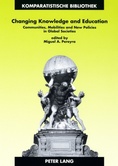 Pereyra, Miguel A. (Editor)
Pereyra, Miguel A. (Editor)
Changing Knowledge and Education: Communities, Mobilities and New Policies in Global Societies
Series: Komparatistische Bibliothek - Volume 18. Frankfurt am Main, Berlin, Bern, Bruxelles, New York, Oxford, Wien, 2008. 367 pp.
Book synopsis
On the move and being transformed. People and knowledge, just like ideas and institutions, travel around the world and change as they do. It is a classic problem in Comparative Education and we do have a contemporary interpretation of it. Currently, we have the generalised discourse of globalisation about 'the cause' of contemporary movements. We have new vocabularies for some of the social processes that may be involved: time-space compression, globalisation, new transnational identities, post-colonialities, and also all sorts of saturating and unproblematic catchwords. We also have some assertions about the educational prospects which must follow from such a cause and such processes - the forthcoming triumphs of e-learning, new forms of knowledge management, better and better skill-formation systems (and so on). This book presents the outcomes of the XXII Conference of the Comparative Education Society in Europe (CESE), held in Granada, in Summer 2006, and brings together studies by twenty-five international leading scholars and new researchers from the scientific fields of education, sociology, economics, and anthropology who thoroughly explore our contemporary reading of what is global, the way we comparatively understand this world of new mobilities and old beliefs and stabilities, in which we witness new movements of persons and peoples, scientific ideas and religions, information and information systems, government and management models, as well as the commodification of available identities.
Contents
- Miguel A. Pereyra: Preface
- Robert Cowen: CESE Presidential Address. What Did We Forget?
- John W. Meyer: Building Education for a World Society
- Bernd Zymek: Two Faces of Internationalisation: Empirical Findings and Socio-historic Interpretation
- Masako Shibata: New Geographies and Regionalism in Education in Asia: Some Reflection on Europe
- Shin'ichi Suzuki: Toward Learning Beyond Nation-States: Where and How? Conflicting Paradigms of Nationalism: East Asia & Europe
- Veronika Susová: Empire in the School: Political Socialization Strategies within Educational Systems of Multiethnic Empire-States: Cisleithania and European Russia 1875-1918 in Comparison
- Leslie Bash: Faith, Science and Modernity: Some Issues for Education in the 21st Century
- David Coulby: Old and New Empires: Religion in Schools, Universities and Madrassas in Europe
- George Flouris/George Pasias: Education at Risk? Discourses of Dystopia and the New 'Panopticon' in the 'Europe of Knowledge'
- Hannu Simola/Risto Rinne: Researching the Political Effects of Quality Assurance and Evaluation in Education - Reflections on Some Comparative Issues in Sociology and the Politics of Education in the Audit Society
- François Orivel/Estelle Orivel : Analyse économique de l'E-Learning: Quelques pistes pour le futur
- Virpi Honkanen: Higher Education Graduates' Self-Employment in Europe
- Philippe Moguérou: Is There a Brain Drain of Doctorates from the European Union to the U.S.?
- Agnès van Zanten: Parental Closure Strategies and New Educational Inequalities: New Opportunities, New Dividing Lines
- Pedro Abrantes: On the Strange Habit of Reading Adversity Instead of Diversity: Madrid's Middle-Schools and Their Latin-American Students
- Olivier Meunier: Towards a Recognition of the Diversity of the Knowledge Forms in Contrast to the Globalisation of Education Systems?
- Jagdish S Gundara: Educating the Police for a Multicultural and Globalised Britain
- Juan Carlos González-Faraco/Malika Bedra Tefiani/Afsata Pare-Kaboré: Gibraltar, l'abîme global. Les relations culturelles et éducatives entre l'Europe et l'Afrique dans un contexte postcolonial
- Davide Zoletto: The «Value» of Cultural Diversity: Cultures of Integration and Global Intercultural Management.
About the editor
Miguel A. Pereyra is Professor of Comparative Education at the University of Granada (Spain), and President of CESE. His research and publications are focused on comparative and cultural history of education, and educational reforms and educational policies.
